production three
One of the most important facets of language learning is the oral production component. Especially in French as a second language context, this is an especially hard skill to master. In immersion classes, where my personal experience is, oftentimes teachers overemphasise the writing production component of language learning. Typical assignments and practices in class focus on conjugation tasks or essay / article writing. Not only do these tasks push oral skills to the wayside, but with the newfound prevalent access to ChatGPT and other generative AI language models, writing tasks are no longer a 'safe' way to assess students as the risk of plagiarism is so high.
I already know ChatGPT tends to be fairly competent with writing correction and grammar in French. It may miss some mistakes sometimes, but with some prompting, it usually is able to access the right answers eventually. In my experience, I have actually found it better than some paid substription correctors, though worse still than having one of my very proficient classmates look over my work. For complete beginners, I would expect them to have some gaps in knowledge from using ChatGPT, but I think high school level students would definitely benefit from using the tool to practice language learning (correction, vocab quizzes, etc). I was more intrigued by ChatGPT's potential to respond to practice needs of oral skills, so I began by asking ChatGPT to run an improv scene with me in French.

ChatGPT immediately took to the task. However, I did have to specifically instruct it to remember to correct my French, or else it would just let the scene continue as if everything was fine.
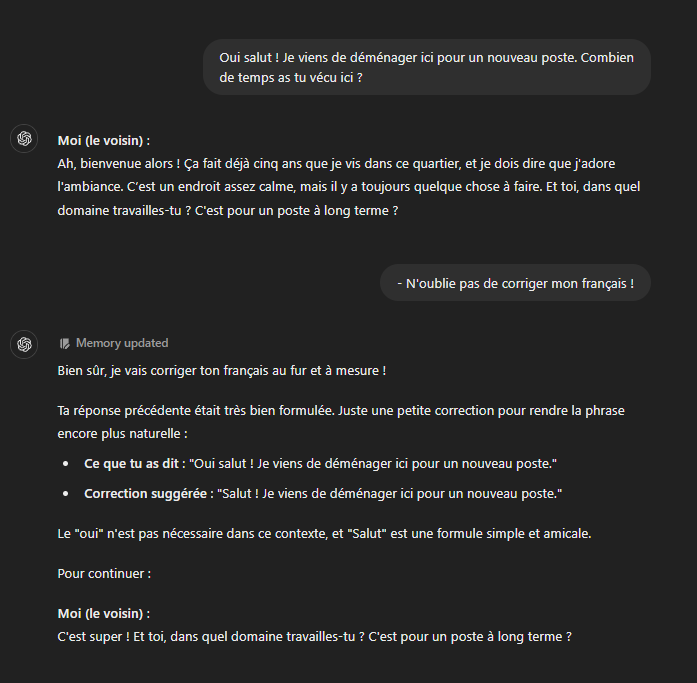
It's corrections were fair and actually helpful. It considered not only the written component (conjugation, writing, accords) but also provided opinions about unnecessary components I had included, which I found surprising.
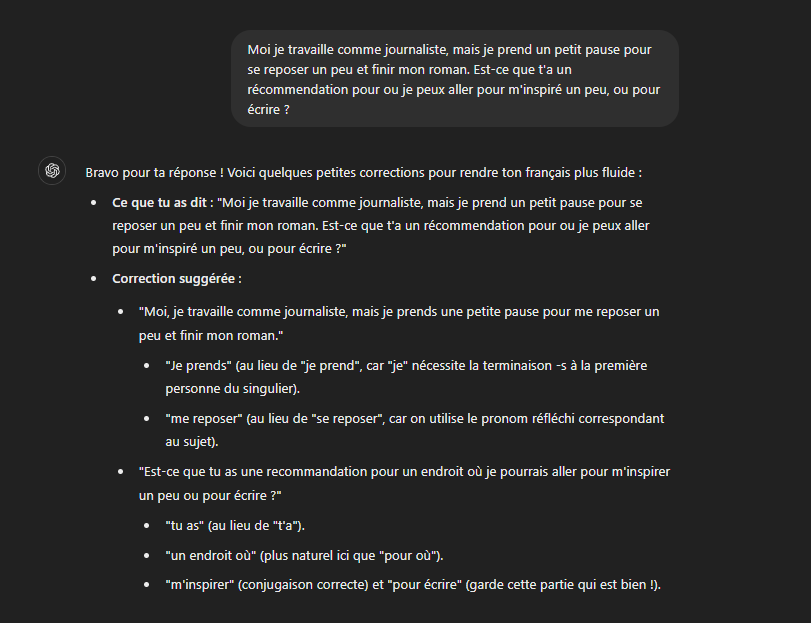
Because our improv scene involved two people speaking to each other orally, I phrased a lot of what I was writing as how I would say it if I were speaking it. With any language, spoken language is often very different than written language because of differences in formality and prosody that come out of differences in social contexts. In French, this is particularly notable as native speakers tend to omit certain phonemes, slur them together, or create extra sounds when speaking (e.g. making 'liasons' between words). It corrected me on my use of 't'a', which is a form often heard orally where speakers combine the words 'tu' and 'as' together. Technically it is not a valid written form.
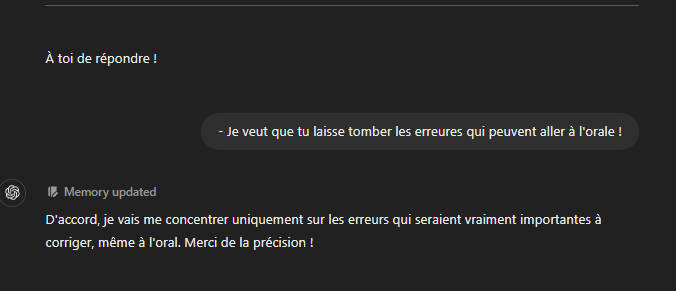
After this, I decided to ask it to role play with me using chiac. Chiac is a French dialect that majoritarily combines French and English in interesting ways. I was trying to see whether it would be able to replicate a French other than the Francais Standard that we are taught in FSL programs here in Canada. Overall, it seemed to have a fair understanding and was able to show me how my sentences could be transformed to have more chiac slang in them.
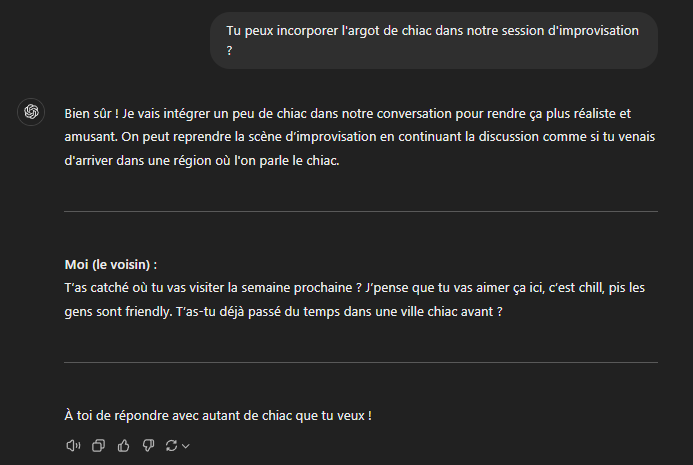
As a grand number of French speakers and French dialects are actually from Africa, I tried then to get it to do an improv scene with me using Nouchi, a French dialect from Côte d'Ivoire. Surprisingly, it kept up fairly well and was able to transform a lot of my sentences into sentences that included more Nouchi.
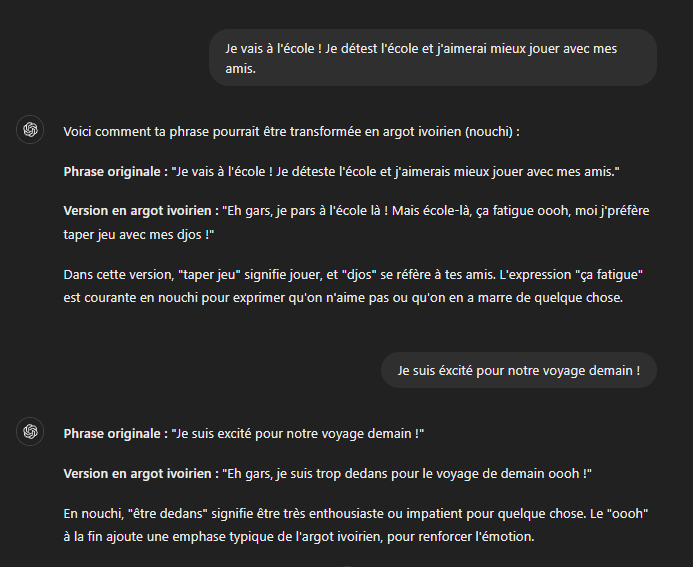
It did surprisingly well with Francais Cangolais (French spoken in Congo) as well. For the most part, I couldn't find any problems with the way ChatGPT understood the nuances of spoken French and some French dialects. However, as an FSL speaker myself, I have to admit that I am not the most aware of every dialect of spoken French that exists. The ones I asked ChatGPT about are relatively well-known dialects and therefore there's a good chance ChatGPT has had decent exposure to these dialects. I would expect it might begin to struggle with dialects that are a bit less well-known.
Overall, despite the risks generative AI models pose to traditional educational methods of evaluation, it does pose the threat (or benefit!) of pushing pedagogies to reflect more practical skills in language learning that would affect students in more real-world contexts. In Algorithmic literacis: Identifying educational models and heuristics for engaging the challenge of algorithmic culture, the authors posit that an important part of new media literacy skills is the ability 'for students to grasp how algorithms privilege (or exclude) certain texts, experiences, and representations, as well as modulate present and future possibilities of action, thinking, writing and inquiry' (p. 26). This sentiment in particular made me wonder whether ChatGPT could be a useful tool in practicing a more practical French, in particular whether it would be of any use at all in exposing students to regional slang. In my education classes, an often broached topic is the concept of la francophonie and how French culture is significantly more diverse than the Standard French we are taught in schools. I would have expected ChatGPT to be trained on mostly Standard French, and that is the type of French it traditionally corrects to and uses. However, if you ask explicitly, it seems to have some ability to use other dialects, Although learning about diverse French cultures in the classroom is a wonderful concept, as a teacher, it can be difficult to incorporate these ideas into the classroom when one does not have personal experience with a certain culture or regional dialect. ChatGPT, however, seems to provide a decent exposure to alternative French than simply that of Francais Standard.
references
Thumlert, K., McBride, M., Tomin, B., Nolan, J., Lotherington, H., & Boreland, T. (2022).Algorithmic literacies: Identifying educational models and heuristics for engaging the challenge of algorithmic culture. Digital Culture and Education.